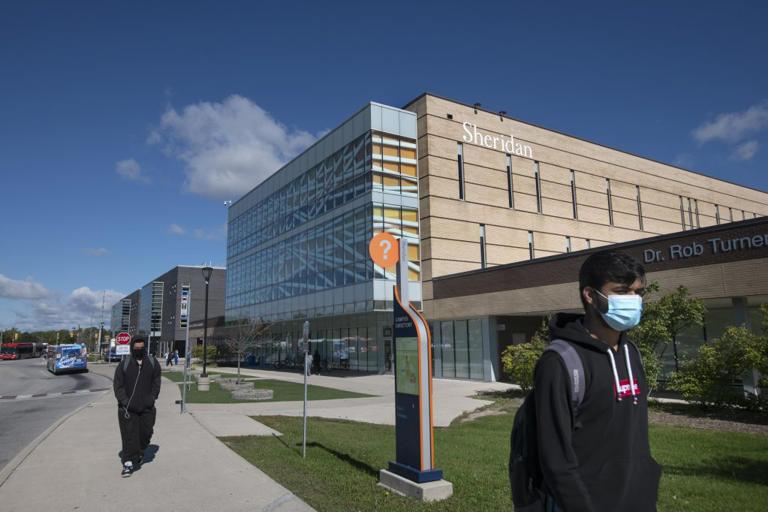Story by Uday Rana •

Students outside Sheridan Collegeís Davis Campus in Brampton,Ont., are photographed on Sept 29, 2021. Fred Lum/The Globe and Mail.© Provided by Global News
Amid talk of a cap on international students due to the housing crisis, Universities Canada says there's no need for any such limit.
Canada currently has 800,000 student permit holders and several federal ministers have hinted that the number be capped in the future to ease housing demand.
At the same time, universities and colleges are pushing back as experts say the fees they can charge international students "fill the gap" in funding for their operations.
“Recent comments conflating international students and the housing crisis are deeply concerning to Universities Canada and our members," said Lisa Wallace, a spokesperson for Universities Canada, in a statement last week.
"International students bring important knowledge, diversity and skills to our campuses, communities and workforce. We must continue to welcome them to study at Canadian universities."
Universities Canada in its statement said housing is a “complex and systemic issue."
The statement called on the federal government to expand access to low-cost financing to build housing, to broaden eligibility for housing programs through the National Housing Strategy and to support affordable housing projects in communities across the country.
Experts say, however, that it is not surprising that Universities Canada is opposing limits on the intake of international students.
Video: Halifax post-secondary students struggle to find housing ahead of school year
Fay Faraday, a law professor at Osgoode Hall Law School and immigration law expert, said Canadian universities depend on international students for a large chunk of their revenue
“The international student population is critical to the functioning of the university because the fees that they pay, which are significantly above domestic fees, fill the gap in the underfunding for the public education system and secondary public education system,” she said.
And she said the dependence has grown over the last few decades.
The number of international students in Canada has quadrupled since the year 2000.
According to Statistics Canada, the gulf between domestic and international fees is significant. In the 2022-2023 academic year, the average domestic student in Canada paid $6,834 in tuition. By contrast, the average international student paid nearly six times that amount at $36,123.
A Global Affairs Canada report said international students in Canada spend $22.3 billion on tuition, accommodation, and discretionary spending every year. This is in addition to international students being a major source of labour for Canada, which has faced a severe worker shortage in recent years.
Video: Canadians must be ‘very careful’ not to blame international students for housing crisis: Trudeau
Speaking after the cabinet retreat last week, Prime Minister Justin Trudeau said it would be wrong to single out international students as the cause of Canada's housing crisis.
“We have to be very careful. Over the past years, we’ve seen a lot of different people and a lot of different groups blamed for the housing crisis. At one point it was foreign homebuyers. At another point it was developers being super aggressive. Another point, it was under-investments by various orders of government. Now it’s people saying, ‘Oh, it’s international students,’” Trudeau said.
“Yes, there’s a lot of different factors that go into this housing crisis. But it’s something that has been brewing and developing over the past number of decades.”
A number of Trudeau’s cabinet colleagues have echoed this sentiment recently, but have also spurred questions about whether the government’s immigration targets need to be reviewed as the country struggles to cope with a housing crisis.
Immigration Minister Marc Miller, Housing Minister Sean Fraser and Public Safety Minister Dominic LeBlanc have all indicated that Ottawa is considering a cap on student intake.
Immigration, Refugees and Citizenship Canada (IRCC), however, told Global News it “does not establish levels/caps for study permits in the way we do for permanent residence programs through the multi-year levels plan.”
The statement from the department said the federal government was “undertaking a review” of the international students program after Miller told The Canadian Press in an interview that he is open to reconsidering international student enrollments, particularly amid fraud concerns.
Faraday said it would take provincial intervention to break the economic model that universities operate on.
"There's no way for the university to wean themselves off that economic model without government funding," she said. "But it's a government choice to starve the public institutions, and that's the problem."
No comments:
Post a Comment